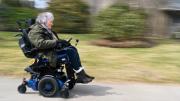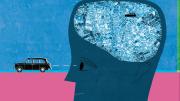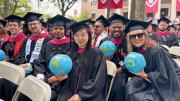Is a blastocyst—an early-stage human embryo—a person? As part of the University’s efforts to encourage public dialogue about stem-cell research, the Harvard Stem Cell Institute (HSCI), in conjunction with Harvard Divinity School (HDS) and the Boston Theological Institute, sponsored a March 14 forum, “Religious Perspectives on Stem-Cell Research,” which centered on this fundamental question. Moderated by Philip Clayton, a visiting professor of science and religion, the forum featured four panelists representing the three Abrahamic faiths: Eric Cohen, executive director of the Tikvah fund (a foundation devoted to Jewish ideas and culture) and a consultant to the President’s Council on Bioethics; Omar Sultan Haque, a Muslim theologian currently studying at HDS and Harvard Medical School (HMS); professor John Davis of the Gordon-Conwell Theological Seminary, an evangelical Christian theologian ordained in the Presbyterian church; and the Reverend Doctor Llewellyn Smith, B.D. ’67, of Andover Newton Theological School, a Congregational minister in the United Church of Christ (UCC). (HSCI faculty members M. William Lensch and Jerome Ritz attended as well to provide scientific input and clarification.)
“Proponents argue that stem-cell research holds the potential for some of the greatest medical and scientific breakthroughs of our time,” began moderator Clayton. “Stem-cell technologies may assist doctors in the treatment of a long list of diseases, including Parkinson’s and some forms of diabetes. It is also fundamental research that holds the promise of extending our understanding of the building blocks of life, with vast implications across the scientific disciplines. But opponents point out that the potential costs are just as high. If the blastocyst is metaphysically indistinguishable from other human persons despite its physical differences, then sacrificing it for research clashes with the fundamental principle of the inviolability of a human life. Our goal…is not consensus. It is, rather, to understand the core motivations and assumptions that lead different religious individuals within different religious traditions to different conclusions, sometimes vastly different conclusions, on this topic.”
Cohen began by noting that widespread Jewish support for stem-cell research is based in part on the high regard that “the Jewish vision places on life and on healing…and on the good of medicine.” We sympathize with this “great moral aspiration to heal,” he said. Judaism also teaches “the basic premise that status is accrued, it is not there from the beginning, that 40 days marks a morally significant point…[thereafter, the embryo] becomes something more significant.
But Cohen disagreed with this mainstream Jewish view. Invoking a scientific rather than a religious argument, he said embryology has taught us that “40 days is simply not a significant moment.” Life begins at conception, he asserted, after an egg and a sperm create something new with the potential to grow into an adult human. Appealing to religion again, he said, “We need to try to see the embryos in the way that God sees us. In the eyes of God, if there is a God, we can’t seem like very much.”
Haque noted that religious authority is dispersed in Islam, so there is no official Muslim consensus on stem-cell research. However, most interpreters of Islamic law “propose a gradualist view of personhood.” For example, the punishment for someone who assaults a pregnant woman, killing her unborn child, increases with the length of the pregnancy. The Koran also teaches that there are gradual stages of physical development: semen, blood, flesh, and then the soul.
Islam places high value on “public good,” which has led prominent clerics in several Muslim countries to praise stem-cell research, including therapeutic cloning, although extreme penalties have been proposed for anyone who attempts reproductive cloning.
Haque’s own view is that an embryo is not a full human person. “I don’t think anyone really acts this way,” he said, noting that even some conservatives who argue that human life begins at conception “would still allow abortion to save a mother’s life. Why would you do that if you didn’t think there were any meaningful distinctions in personhood?” he asked. “The key issue,” he said, “is that just because an embryo is a member of our species does not mean that it has the same moral status as a child with diabetes.” Of the frozen embryos created by in-vitro fertilization clinics and slated to be discarded, he argued that “destroying them with regulations and under the equally, if not greater, moral needs of the living—suffering children, for example, whose moral status no one would debate—is consistent with respecting the moral status of an embryo….” He attacked the “irresponsible deontology” that ignores the “necessity of tradeoffs amongst competing moral demands.”
Davis, who opposes stem-cell research, articulated a conservative Christian view, noting that in the Bible, the human trajectory of Jesus Christ begins at conception, “in the womb of the Virgin Mary.” “Of course I fully realize,” he continued, “that in a pluralistic culture like ours, appeals to holy text from whatever religious tradition might not have a lot of traction in terms of public policy….” He argued, therefore, on secular grounds, that our society is experiencing a failure of vision: we must “try to protect all human subjects against whatever well-intentioned therapeutic intent or economic interest, so that human persons are not unnecessarily or unintentionally commodified.”
Smith articulated a very different Christian view. Noting that “no one individual speaks for the denomination,” she emphasized the UCC’s role in providing resources for “members to become informed about developments in genetic technology and the moral, ethical, social and theological implications raised by these developments.” The UCC national committee on genetics concluded that it does not “object categorically to human pre-embryo [an embryo in the first 14 days after fertilization] research, provided the research is well justified in terms of its objectives, that the research protocols show proper respect for the pre-embryos, and that they are not implanted.” Smith did raise a concern about the social justice of spending tremendous sums of money on stem-cell research, however, noting that “more people die of diarrhea in the world than anything else.”
Although the panelists failed to agree on the moral status of the embryo, and thus reached divergent views about the permissibility of stem-cell research, all agreed that an embryo was nascent human life that deserved respect, and all affirmed the desirability of medical advances. “I think we’ve got a true moral dilemma that our tradition and our scripture do not fully address,” Smith concluded. She urged continuing conversation, saying, “We are a long way from a clear answer…and a long way from successful implementation of these therapies.”





